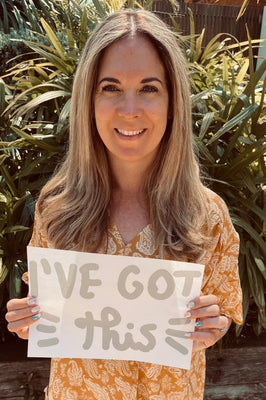With no symptoms or family history, Cath had no reason to have breast cancer on her mind, until a routine screen changed everything.
At the beginning of this year, Cath Jones was enjoying life as a teacher and mother of two. She had no family history of cancer so it wasn’t something she thought of too much. “I knew some friends who have unfortunately been through the cancer journey but never thought it would be me,” says Cath. She’d been diligent about self-checking her breasts but didn’t think to do much more until she saw an ad that changed her course. “I saw an advert for screening for over 40-year-olds so I booked in to have my first mammogram. That was when I was diagnosed,” Cath says.
Learning of a cancer diagnosis is difficult in the best of times, but being diagnosed during the restricted pandemic made it harder right from the start as she was alone when she got the news. “When I was diagnosed, I was scared, worried, petrified, shocked and upset. A bag of emotions. I was scared I wouldn’t have much time left with my family. I felt helpless and just wanted to do anything possible to get rid of it.”
The first person she told was her husband, but because he wasn’t allowed to physically be there with Cath, she got a lot of her initial face-to-face support from healthcare workers. “They were amazing, kind and caring. My surgeon told me what the next steps were and she was empathetic and had kind eyes. A true hero. She saved my life and I am eternally grateful for her,” Cath says.
Despite the challenge of COVID, Cath considers herself lucky in terms of treatment. Within weeks she’d had a mastectomy and the cancer removed. Early treatment meant that Cath did not need to have chemotherapy, but the road to recovery is still a long one. “After my mastectomy, I had daily nurse visits for at least three weeks. I had to have physio to regain some of the movement in my arm because I had lymph nodes removed. I will be on medication for 5-10 years but I am so lucky I didn’t have to have radiation or chemotherapy. I have a few more reconstructive surgeries to get through. I am hoping they can go ahead but are currently on hold due to COVID,” she says.
Disrupted surgery logistics has been one of the toughest challenges for Cath, who lives in the then locked-down Northern Beaches of Sydney. The surgeries are an important part of Cath’s recovery, and not knowing when they will be able to go ahead is a heavy unknown.
While the process is stalled, Cath describes her cancer as ‘always on her mind’, but lockdowns also meant that a physical support network wasn’t easy to come by. Like most parents in lockdown, the mother of a five- and seven-year-old had to home school her children, all while trying to recover from surgery. “It was a tricky time as we were all isolating during COVID but they all showed their love and support through messages, deliveries and phone calls. The support from family, friends and the community was incredible. I had flowers, meal vouchers and deliveries every day for a month or more. It was amazing. I have a wonderful village.”
Just knowing that people were thinking of her made a huge difference for Cath. She encourages anyone that can play a supporting role to continually check-in and talk to their loved ones undergoing treatment. “Try and help them where you can. Messages, check-ins and support mean so much. Be there for them,” she says.
Cath is most grateful for the support of her husband and the fact that she could draw strength from being a mother. “My husband has been my rock throughout. He has held my hand all the way and given me that extra hug when I’ve needed it. Having children has also made me stronger, I know that everything I do has to be to fight to spend more time with them,” says Cath.
Her message to anyone that has been recently diagnosed is to have faith in their strength and the support that our health system can provide. “There are amazing, caring surgeons and healthcare workers out there that can help you beat this. You are stronger than you ever imagined. Ask for help if you need it. Talk about your journey. You are not alone. You are braver than you ever imagined.”
And to all women, her message is no doubt to get checked. “I really want to encourage people to get screened regardless of if they have symptoms or not. I had none and had cancer,” says Cath. “Even when life is busy I feel that people should put their health first. Get that routine check done and make it a priority. Make your health your priority.”
Being diagnosed with and treated for cancer during the pandemic has cultivated new traits in Cath. Before her diagnosis, she described herself as thoughtful, kind and caring. Now she confidently adds strength to her list of qualities. “I feel like I am stronger than I ever thought I was. I know that I can get through anything now,” she says.
It’s fitting then that her Powerpants affirmation is ”I will get through this! I’ve got this!”
"Make your health your priority."
Cath Jones
*Breast cancer remains one of the most common cancer among Australian women and survival rates continue to improve. Early detection is key.
Be breast aware and check for changes in your breasts regularly. If you're over 40, you can book a free mammogram through BreastScreen Australia.
About the Author
Alegria Alano is a roaming writer and a bottomless pit of curiosity. Most of her time is spent exploring new places, interesting ideas and fascinating people. She writes about what she discovers in a diary, on alegria-alano.com, and more regularly on the gram at @alegriaalano.

